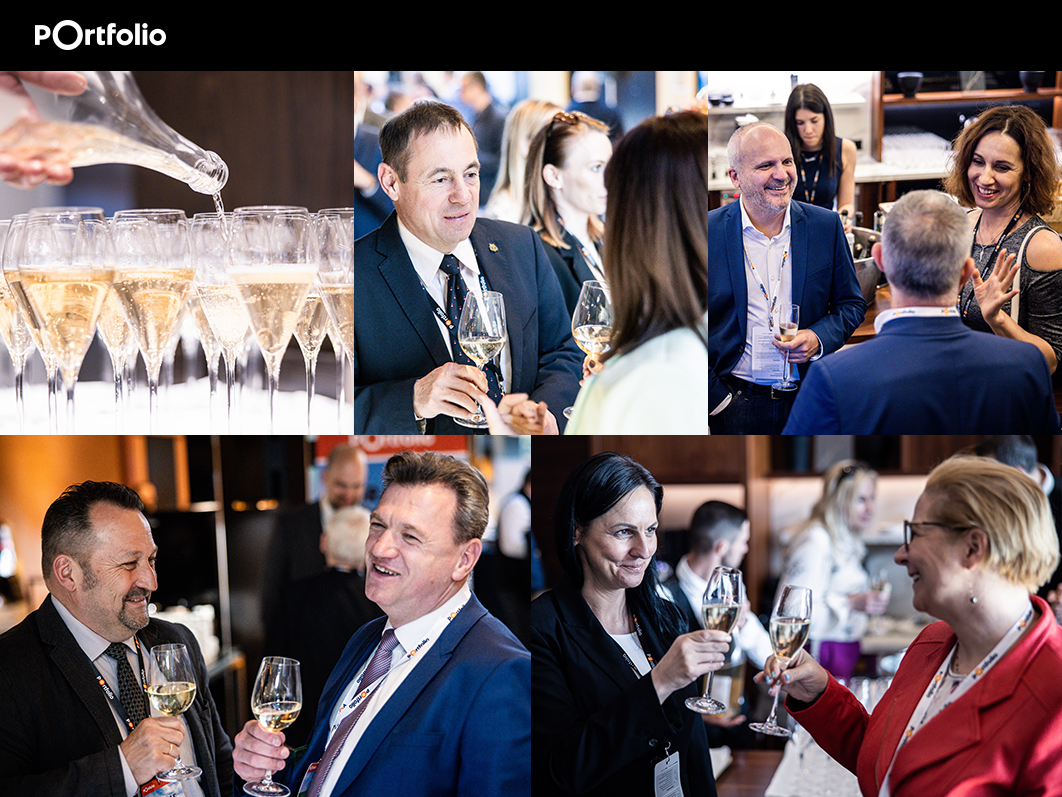



The AGROFOOD 2024 conference will be held at the same venue as our AGROFUTURE 2024 conference on the 22nd of May, and interested attendees can purchase 50% discounted tickets for HUF 56,900 + VAT/person.
You can indicate your intention to participate by entering the code "AGRO PASS" in the comment field on the second page of the online registration form.
Confirmation and a fee request for the AGROFOOD 2024 conference will be sent to you in a separate email within a few days.
ATTENTION:
By using the code AGRO PASS, you explicitly consent to the Organiser recording your registration for the AgroFood Conference using the data provided during this registration based on the discounted terms outlined above.
Are you a smallholder? Or have you started farming recently? Now you can participate in the outstanding spring agricultural event, the AgroFood 2024 Conference in Kecskemét, on 22 May with a 50% discount.
Please, fill out the following form, and Portfolio’s professional team will assess your claim so that you can redeem your discounted ticket.
If you have filled out the form, save it and send it to kistermeloikedvezmeny@portfolio.hu.
The subject of the letter: Portfolio AgroFood 2024 – smallholder application
You can access the form by clicking here.
Food industry enterprises are in the spotlight in the current EU budget cycle, as they have access to significantly larger rural development funds compared to previous cycles, totalling several hundred billion forints, to invest in enhancing their competitiveness. The session will present the main development directions for the industry and, depending on the size of the company, the areas of investment perspective. Experts will review what rural development grants have been or will be opened up for players in the industry, who and for what purposes are most likely to win grants, how to submit successful applications, and what could be the main evaluation and assessment criteria.
Which might be the main development areas for the domestic food industry?
Which food industries are most worth investing in?
What rural development tenders are available for food businesses?
Which market players should apply for which development objectives?
How to submit successful applications
What are the main evaluation and assessment criteria?
What other support can food businesses expect?
08:30 - 08:35
08:35 - 08:50
The strategic role of the Hungarian food industry – Subsidies and development directions for the sector
Speaker: Márton Nobilis, State Secretary, Agricultural Ministry
08:50 - 09:05
A brief history of the Hungarian food economy and a modern model that can be built on it
Speaker: Dávid Hollósi, President , Board Member, Magyar Bankszövetség agrár munkabizottság
09:05 - 09:20
The significance of food sovereignty in crises – Development perspectives and painful experiences
Speaker: Csaba Gyuricza, Director, Nemzeti Agrárkutatási és Innovációs Központ
09:20 - 09:30
The birth of HonestFood: Let’s make the world a better place together with goodness and decency
Speaker: Giacomo Pedranzini, Executive Director, Kometa 99
09:30 - 10:20
Roundtable discussion: Highlighted rural development subsidies for food industry enterprises – Main directions of industry development, funding opportunities, evaluation criteria
Moderator: László Hazafi, agriculture journalist, Portfolio/Agrárszektor
Conversation participants:
There has been a substantial drop in demand in the domestic food market recently, significantly reducing the sales opportunities for businesses in the industry. The experts in this session will analyse what demand trends are expected to prevail in the food market this year and in the longer term and the main factors that could influence food consumption. In addition, there will be a discussion on how consumer expectations regarding food are changing, what characterises food industry and food retail supplier relationships, as well as the requirements retailers impose on food industry enterprises and what practices they employ during the sale of food products. The other main topic of the session revolves around the short- and long-term financing opportunities that food industry enterprises can expect in the upcoming period. The roundtable will discuss how the improving macroeconomic environment affects the financing opportunities for food businesses, the industry's resource needs, and the specific aspects of the banking sector that determine the lending to companies. Additionally, the session presents how credit conditions may change in the near future, what new credit products banks are introducing to the market for the food industry, and what discounted financing options industry enterprises can avail themselves of.
How is demand for food on the domestic market likely to develop in the coming period?
How are consumer expectations of food changing, and how can producers meet them?
What are the characteristics of food industry/food retail supplier relationships, and how can they be improved?
What requirements do retail chains impose on food suppliers?
What commercial practices characterise the domestic food market when selling products?
How can financing opportunities for food businesses be increased in the coming period?
How do banks assess the industry's situation, and what specific aspects do they take into account when providing financing?
How might credit conditions for food businesses change in an improving macroeconomic environment?
What are the primary banking requirements for lending to the food industry?
What new food credit products are banks entering the market with?
Can food businesses count on soft loans?
10:40 - 10:55
Market challenges, risks, and opportunities for food producers
Speaker: Attila Vörös, Managing Director, Felelős Élelmiszergyártók Szövetsége
10:55 - 11:40
Roundtable discussion: After a severe downturn, what can be expected in the domestic food industry market? – Demand trends, consumer expectations, trade requirements and practices
Moderator: Attila Vörös, Managing Director, Felelős Élelmiszergyártók Szövetsége
Conversation participants:
11:40 - 11:50
Bank financing and the EU Common Agricultural Policy
Speaker: Csaba Zsarnóci, Head of Department, OTP Bank
11:50 - 12:35
Roundtable discussion: Key financing issues in the food industry – Access to credit opportunities, financing costs, new banking products and structures
Moderator: Zoltán Bán, CEO, Net Média (Portfolio Group)
Conversation participants:
Food companies have (also) faced significant employment problems recently, and finding the right – skilled – workforce will remain a challenge for most businesses. The session will examine how the labour market situation could evolve in the near future and whether employment opportunities in the industry could improve. The experts will also analyse how labour costs in the food industry may change and what role foreign labour may play in industry employment. There will be focus on the biggest opportunities for progress in vocational training, additional public instruments to reduce employment difficulties, and practical solutions for businesses in the industry to tackle their labour problems.
What are domestic labour market trends, and what changes can be expected in the coming period?
How can employment opportunities in the food industry change in the labour market?
What plans and programmes are in place to increase the supply of skilled food industry workers?
What role can foreign labour play in the domestic food industry?
What other public instruments can be considered to alleviate employment problems?
What are the most effective practical solutions to reduce labour shortages at a company level?
How can labour costs in the food industry be changed and optimised?
13:35 - 13:50
Labour market developments and prospects – Government measures and plans
Speaker: Sándor Czomba, State Secretary, Ministry of National Economy
13:50 - 14:40
Roundtable discussion: Filipinos in the Hungarian food industry? – Employment challenges in the sector, labour market overview, potential solutions and employment facilitation
Conversation participants:
Food businesses are facing significant challenges due to regulatory changes recently entering into force in product packaging. The introduction of Extended Producer Responsibility (EPR) and the Deposit Return Scheme (DRS) have brought extensive changes to industry operation and put companies in a new position. The main themes of the session will be how the food industry can meet the new requirements, what further regulatory steps are expected for packaging, and how to optimise and reduce additional burdens in the new legislative environment. The experts also provide an overview of the main trends shaping product packaging and the expected evolution of packaging raw material supply and prices.
How to optimise the additional burden of Extended Producer Responsibility in food business management
How will the Deposit Return Scheme change the way the industry works?
What other legislative changes or amendments to product packaging are expected?
How can packaging prices develop in the domestic market?
What are the most crucial trends in product packaging in the food market?
15:00 - 15:15
How to reduce EPR charges in transport packaging?
Speaker: Gábor Arató, Executive Director, Manupackaging Hungary
15:15 - 16:00
Roundtable discussion: Focus on packaging: The impact of extended producer responsibility and the mandatory deposit return system on the food industry – Price trends, new products and technologies in the packaging material market
Conversation participants:
This session will focus on the export development opportunities of domestic food businesses, highlighting which relationships offer the greatest market access and breakthrough opportunities for the domestic sector. The experts will also analyse the most effective tools for increasing export performance, the role of community agricultural marketing, and other effective marketing strategies that can contribute to successful (external) market presence.
Which relations offer the greatest opportunities for domestic food companies to expand abroad?
Will the European dominant role in Hungarian agricultural exports be maintained, or will the strategy of "opening towards the East and the South" provide expansion opportunities?
What are the most effective tools for food export development and financing?
What role can community agricultural marketing play in improving foreign market positions?
What other marketing strategies can contribute to food producers' successful market presence?
16:00 - 16:15
The export development tools of the Agricultural Marketing Centre – Achievements and plans for this year
Speaker: Gergely Giczi, Deputy General Manager, Agricultural Marketing Centre
16:15 - 17:00
Roundtable discussion: The prospects of the domestic food industry for international market breakthroughs – The possibilities of efficient export development and successful community agricultural marketing
Conversation participants:
Be our guest for a glass of champagne after the technical programme, and don't miss the networking opportunity with conference participants and speakers!

Main professional partner
Gold Sponsor
Silver Sponsor
Silver/Expert Sponsor
Bronze Sponsor
Official car rental partner
Carbon Offsetting Partner
Main Media Partner
Media Partner
Accessibility Partner
Organisation, general questions


Sponsorship


Program
